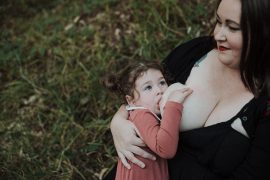By Emma Pickett
Continuing to breastfeed after the first few months can bring some challenges. Sadly, one of the biggest struggles can be dealing with the lack of education in wider society. You might imagine that at least parents are safe when talking to those who are medically trained, but unfortunately there are no guarantees.
Parents continuing to breastfeed do report that conversations with dentists can be among the most challenging conversations they have with health professionals.
On a surface level, this is perhaps not surprising. This is a group of professionals who come across children suffering with severe dental problems and at the same time, they may have little or no training in breastfeeding and lactation.
Breastmilk enters the body through the mouth. It contains ‘sugars’. You can see how links end up being made: “(Breastfeeding) was not even mentioned, not once. We were taught to advise parents to stop all milk at night after the first year to avoid bottle caries.” (Richa Sharma, a general dental practitioner in the UK).
Our sympathies lie with parents who are often left feeling unsupported and even blamed when they have followed all the international guidance around breastfeeding.
But let’s feel some sympathy for the dentists too. They often receive recommendations that not only contradict each other but contradict what they see in front of them as they work with families who value breastfeeding. There are dentists out there standing up for breastfeeding and advocating for families but doing so without the full support of their colleagues.
A 2019 study wrote,
“Current recommendations by the European Academy of Paediatric Dentistry, American Academy of Paediatric Dentistry, and International Association of Paediatric Dentistry advocate weaning from breast milk and avoiding unrestricted breastfeeding after the eruption of primary teeth in order to lower the risk of early childhood caries (ECC). However, World Health Organization, American Academy of Paediatrics and nutritional recommendations support exclusive breastfeeding up to six months of age, following continued breastfeeding along with appropriate complementary foods, favouring unrestricted and prolonged breastfeeding even beyond the age of two.” (Markovic et al, 2019)
Despite some dentistry organisations claiming otherwise, these researchers stated, “Current literature data revealed possible link between breastfeeding and ECC, however without evidence strong enough for the appropriate oral health preventive recommendation to be provided.”
The bottom line is the evidence is not strong enough to suggest a link with continued breastfeeding and early childhood caries, so in the absence of that link, no one should be telling anyone to stop breastfeeding as if there aren’t any other health considerations to take into account. We are looking at a whole child of course but we don’t even have a definitive answer when we’re just considering teeth. Studies show that breastfeeding helps to prevent malocclusion. Children that breastfeed for longer are less likely to need braces or correction of their bite. So even if we are talking about just the teeth, some studies are saying ‘there may be a link and more evidence is needed’ and other studies are saying, ‘please continue breastfeeding’.
Speaking on behalf of UK government, Public Health England published a statement, updated in 2019, stressing the importance of dentists supporting breastfeeding and providing evidence-based care. They state:
“Breastfeeding is the physiological norm against which other behaviours are compared; therefore, dental teams should promote breastfeeding and include in their advice the risks of not breastfeeding to general and oral health … Since 2001, the WHO has recommended that mothers worldwide exclusively breastfeed infants for the first six months to achieve optimal growth, development and health. Thereafter, they should be given nutritious complementary foods as breastfeeding continues up to the age of two years or beyond. These guidelines were reiterated in the WHO’s Global Strategy (WHO, 2003) and endorsed by the Scientific Advisory Committee on Nutrition (SACN).”
(Public Health England 2019)
The evidence that breastfeeding up to 12 months is protective of dental health is well-established, or to re-word: that not breastfeeding increases risk of dental caries.
Breast milk, unlike formula, contains Lactobacilli, human casein and secretory IgA among other substances, which inhibit the growth of cariogenic bacteria, particularly oral Streptococci, and prevent it sticking to teeth.
Lactoferrin, which is a protein found in breastmilk, kills the bacteria responsible for dental decay (Streptococcus mutans).
Once a child is older than 12 months, the message gets more complicated. Some sources state that continuing to breastfeed after 12 months may increase the risk of dental decay. One systematic review by Tham et al. is often cited as making a link between risk of caries and continued breastfeeding (Tham et al. 2015).
Tham et al. is a meta-analysis, meaning they are assessing and studying previous research completed by others to try and find the big picture. They did note a relationship between prolonged breastfeeding and dental decay but they describe problems with the way the data was collected (sometimes retrospective interviews) and the fact that variables were not sufficiently controlled. Unfortunately, this message is often lost when professionals talk about Tham at el. Even The Lancet, in their 2016 breastfeeding series, used this study to assert that breastfeeding beyond 12 months increased risk of dental decay and this was the one downside of continuing to breastfeed.
The authors themselves state that:
“Only a few studies included in this review controlled for key confounding factors and this may have resulted in an over‐estimation of the role of prolonged, frequent and nocturnal breastfeeding in the development of dental caries. Until the dietary and oral hygiene details of these children are controlled for, we cannot be certain whether prolonged, frequent or nocturnal breastfeeding can be principally associated with early childhood caries.”
(Tham et al. 2015).
Another meta-analysis also noted a relationship between prolonged breastfeeding after 24 months and dental caries but described this as being based on low quality evidence:
“Of the 13,831 papers identified, 627 were screened in duplicate; of these, 139 were included. The highest-level evidence indicated that breastfeeding ≤24 mo does not increase early childhood caries risk but suggested that longer-duration breastfeeding increases risk (low-quality evidence).” (Moynihan et al. 2019).











